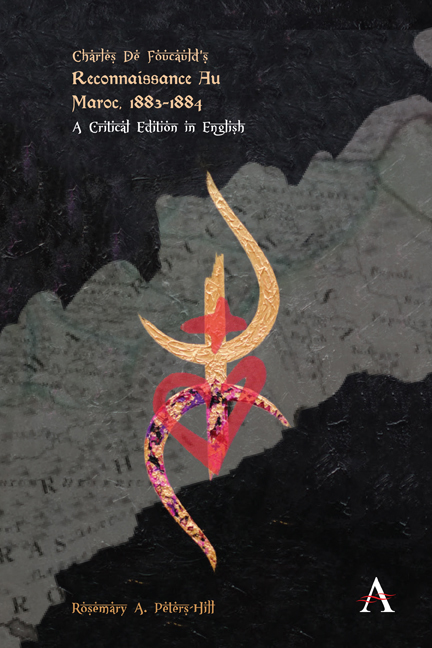Book contents
- Frontmatter
- Contents
- List of Figures
- Acknowledgments
- “There are no roads”: Charles de Foucauld’s Reconnaissance au Maroc—a Critical Introduction
- Charles de Foucauld, Reconnaissance au Maroc, 1883–1884
- Letter to François de Bondy
- Introduction
- Avant-Propos
- I Tangiers to Meknès
- II Meknès to Qaçba Beni Mellal
- III Qaçba Beni Mellal to Tikirt
- IV Tikirt to Tissint
- V Sojourn in the Sahara
- VI Tissint to Mogador
- VII Mogador to Tissint
- VIII Tissint to the Dadès
- IX The Dadès to Qçabi ech Cheurfa
- X Qçabi ech Chorfa to Lalla Maghnia
- Appendix: The Jews of Morocco
- Note on the Materials Used to Draw Up My Itinerary
- Report Delivered to the Société de Géographie de Paris in Its General Session of 24 April 1885
- “Itineraries in Morocco”
- Afterwards: An Afterword
- Glossary of Terms
- Bibliography
- Index
Appendix: The Jews of Morocco
Published online by Cambridge University Press: 20 January 2022
- Frontmatter
- Contents
- List of Figures
- Acknowledgments
- “There are no roads”: Charles de Foucauld’s Reconnaissance au Maroc—a Critical Introduction
- Charles de Foucauld, Reconnaissance au Maroc, 1883–1884
- Letter to François de Bondy
- Introduction
- Avant-Propos
- I Tangiers to Meknès
- II Meknès to Qaçba Beni Mellal
- III Qaçba Beni Mellal to Tikirt
- IV Tikirt to Tissint
- V Sojourn in the Sahara
- VI Tissint to Mogador
- VII Mogador to Tissint
- VIII Tissint to the Dadès
- IX The Dadès to Qçabi ech Cheurfa
- X Qçabi ech Chorfa to Lalla Maghnia
- Appendix: The Jews of Morocco
- Note on the Materials Used to Draw Up My Itinerary
- Report Delivered to the Société de Géographie de Paris in Its General Session of 24 April 1885
- “Itineraries in Morocco”
- Afterwards: An Afterword
- Glossary of Terms
- Bibliography
- Index
Summary
Jews in Morocco divide into two classes: those of the regions under the sultan's authority, the Jews of the blad el makhzen; and those of the independent regions, the Jews of the blad es sîba.
The first, protected from European powers and supported by the sultan, who sees in them an element necessary to the commercial prosperity of his empire and his own wealth, use corruption to control the magistrates—to whom they raise their voices, while still kissing their hands—; acquire great fortunes; oppress poor Muslims; get respected by the rich; and manage to resolve the challenging dilemma of satisfying all at once their avarice, their pride, and their hatred of whatever is not Jewish. They live handsomely, are lazy and effeminate, and possess all the weaknesses and vices of civilization, with none of its finesse. With neither redeeming qualities nor virtues, locating happiness in the fulfillment of the senses and willing to do anything to attain it, they are happy and believe themselves wise. The Jews of the blad es sîba are no less contemptible, but they are unhappy: tied to feudal lands, each with a Muslim lord of whom they are the property, squeezed constantly, and watching their hard-won earnings taken from them daily, with no security for either their person or their property, they are the most unfortunate of men. Lazy, greedy, gluttonous, drunken, liars, thieves, and most of all full of hatred, they have all the vices of the makhzen Jews, minus their cowardice. The dangers that threaten them at every moment give them a strength of character unknown to the latter Jews, and which sometimes degenerates into bloody savagery.
Israelites of the Blad El Makhzen
The Jew can be recognized by his skullcap and black slippers: he is not permitted to wear slippers of another color. In the countryside, he can go about via donkey or mule, but if he encounters a cleric or a chapel, he dismounts and takes a detour on foot. At tollbooths or city gates, he is obligated to pay a tax, as are beasts of burden. In the city, he removes his shoes and walks barefoot; the streets neighboring certain sanctuaries are off-limits to him.
- Type
- Chapter
- Information
- Charles de Foucauld’s Reconnaissance au Maroc, 1883–1884A Critical Edition in English, pp. 375 - 392Publisher: Anthem PressPrint publication year: 2020



